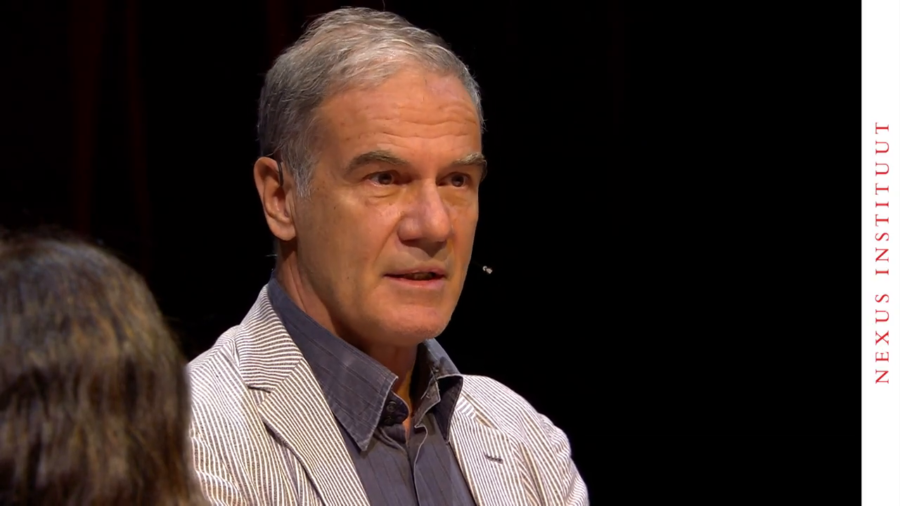Edoardo Albinati: Yesterday coming to Amsterdam I was thinking about the subtitle of this symposium that ends with the words “in a disputed age.” So this is supposed to be a disputed age. And I was remembering for the hundredth time some wonderful verses by William Butler Yeats from a poem called “The Second Coming” in which he says more or less the best lack all convictions while the worst are full of passionate intensity.
So in a way, if I am dispirited I’m quite happy to be, compared to the ones who are spirited now. I would like to make a sort of defense of a term that has been used in the very interesting debate between Mr. [Aleksandr] Dugin and Mr. [Bernard-Henri] Lévy. That is the word “nihilist,” or “nihilism.” I feel I’m one. And I’m not proud and not ashamed to be. At least in the sense that I’m very diffident towards values, any kind of. Because you know, values can be very dangerous. And as the poem of Yeats says, the passionate intensity in believing in something can be very dangerous.
I taught and I teach to people who belong or belonged to criminal organizations who were full of values. Who had values for every [one] of us. And faith. They were faithful men. And passionate. So, if this is a dispirited age, we should at least defend for awhile our sickness, our weakness, our doubts, our lacking of convictions instead of having ones too strong and dangerous. [audience applauds]
Leon Wieseltier: I have a question for you. I think that it’s clear, it’s obvious, that beliefs and values and convictions can be abused and can be perverted. And that evil can be committed in the name of values that purport to be good. I think this is certainly historically true and etc.
But do you really think that a life without belief is preferable to a life spent in clarifying the difference between true belief and false belief, or good belief and bad belief? In other words I have family, too. I can’t imagine how I could raise my son on an absence of conviction. And my question to you is, it is true that sometimes you are given meals that are very terrible and that can even poison you and kill you. But for that reason would you stop eating entirely? Would you give up all food because some food can do you harm? I don’t… I’m not sure I understand what you’re arguing for.
Albinati: Maybe it has been a miracle with my family, but I never had to teach to my children values like respect the others or don’t kill the others. I had just to say to them go and wash your hands.
Nadine Labaki: That’s a value.
Rob Riemen: What is it that you learned about human nature, teaching those pupils of yours in prison?
Albinati: That’s a wide, wide question. Well, I learned what I knew before going there, that human nature is bad. And so you have to do your best to prevent, to limit the damage that a man can do to other men or women. And that’s all our duty. Not much more than this. To put down the the pain and suffering and… But because evil is is there, is among us, is us. If the [ban?] would be perfect there would be not much use in making such great effort.
I had a very strange conversation when I was working fifteen years ago in Afghanistan as a volunteer of the United Nations together with other people doing my same job. And I was the only one to think that man was bad. [Riemen laughs] And we were surrounded by destruction. So what are we doing here, if man is not bad. We have proof [crosstalk] of this simple—
Labaki: I don’t agree. I don’t agree with you. I mean it’s too fatalistic to say man is evil. I mean, there’s a— Of course there’s evil, but there’s a reason why this evil existed and I think it’s all in the childhood, it’s all in… I think the source of evil in the world is unloved childhood, is neglected childhood. We cannot just deal with it as if it was a fact of life. We should go to the heart of the problem and start working on it. I think it would be too fatalistic and cynical to just say evil is there. We are wired for empathy. We are wired for love. We are wired for feeling the others. I don’t agree at all with your vision of humans.
Further Reference
Nexus Institute Symposium 2019, The Magic Mountain Revisited: Cultivating the Human Spirit in Dispirited Timesevent page
